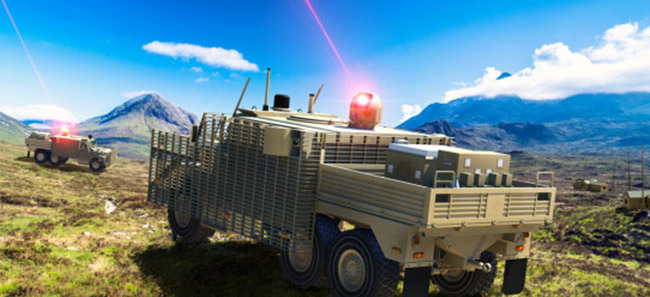
Contracts Will Deliver High-Energy Laser Weapons System to UK Forces

Raytheon UK announced a partnership with the U.K. Ministry of Defence to bring a High-Energy Laser Weapons System demonstrator to frontline U.K. armed forces. The demonstrator, to be delivered to MOD by 2023, will be installed on the U.K. Wolfhound land vehicle, similar to the one pictured. Courtesy of Raytheon UK.
Next-generation laser weaponry technology is the goal of a partnership between Raytheon UK and the U.K. Ministry of Defence (MOD). Raytheon UK is partnering with the MOD to equip the country’s armed forces with Raytheon Technologies’ High-Energy Laser Weapons System (HELWS), a directed-energy weapon that can fire indefinitely when it has access to a sufficient power source.
Raytheon UK will install an HELWS demonstrator on the British army’s Wolfhound armored vehicle to test the laser’s effectiveness against unmanned aerial vehicles (UAVs) and other air threats during a six-month trial scheduled to begin in spring 2023.
Although the HELWS demonstrator is from the U.S., many of its capabilities, including the command-and-control system, GPS antenna, external tracker/radar, safety, training, and integration, are being developed in the U.K.
The Raytheon UK-led team includes industry experts from Fraser Nash, NP Aerospace, and LumOptica. NP Aerospace will integrate the laser system onto vehicles, and Fraser Nash and LumOptica will provide system safety and independent assessments of the solution.
The result will be a system largely developed in the U.K.
“In essence, this means that we will have our own ability to use the system as required, implementing U.K. rules of engagement and understanding, and modifying the command-and-control systems to meet operational needs,” said Mike Cooper, Raytheon UK’s head of strategy and business development (novel systems).
The partnership is one of three contracts totaling around £72.5 million ($99.04 million) that the MOD has awarded to U.K. businesses for the development of advanced laser and radio- frequency weaponry. In March 2021, the U.K. government announced that it would commit £6.6 billion ($9.02 billion) over the next four years to the research and development of novel weapons. Driving the investment is the growing threat from low-cost systems such as UAVs, rockets, artillery shells, and mortars.
“It is easy for an adversary to launch 30 to 40 UAVs at the same cost as one defensive missile,” said Toby Marshall, Raytheon UK’s novel weapons capture lead. “By having a highly accurate high-energy laser or directed-energy system, where the cost per shot is significantly lower, you can defeat whole swarms of these threats. This is because, unlike conventional weapons systems, you have an infinite arsenal.” When provided with an ample power source, the HELWS can give military personnel virtually unlimited ammunition at low cost.
“These technologies have the potential to revolutionize the future battlefield for our armed forces, enabling the prosecution of new targets in the land, sea, and air domains and allowing commanders to meet mission objectives in new ways,” said Shimon Fhima, MOD director of strategic programs.
Leveraging Raytheon Technologies’ proven operational technology in the HELWS trials will help fast-track the U.K.’s development of directed-energy solutions. Part of the challenge of bringing laser weapons to the battlefield has been integrating accuracy and safety into the laser’s operation. “The critical elements are being able to detect the target, track very accurately, and then engage the target with the laser system,” Marshall said. “All these mechanisms, such as the precision targeting and detection, logistics, and operational safety, will be supplied by our Raytheon UK team.”
System testing by Raytheon UK and other MOD industry partners will take place from 2023 to 2025. It will focus on operation and maintenance of HELWS and other new systems and will provide the MOD with the information and experience needed to assess whether directed-energy weapons can be fully embedded on other MOD assets in the future.
The long-term goal with the demonstrator system is to provide this capability as a U.K. sovereign system for domestic and overseas customers.
“By 2025, we will have placed the country at the forefront of this emerging technology, equipping British frontline armed forces with the best affordable sovereign solutions,” said Alex Rose-Parfitt, engineering director at Raytheon UK.
Published: September 2021